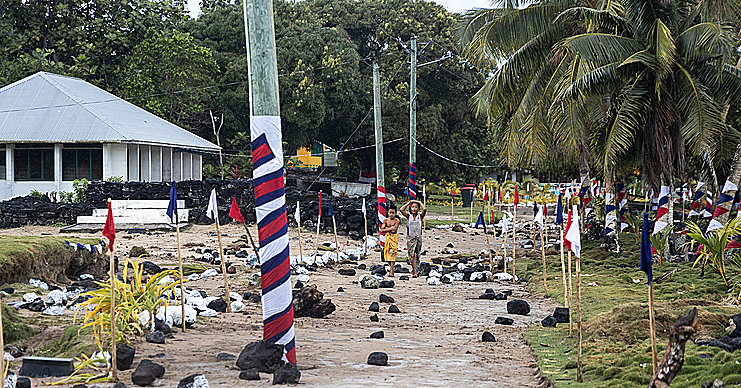New order undermines courts, democracy
 By The Editorial Board
•
05 July 2021, 12:00AM
By The Editorial Board
•
05 July 2021, 12:00AM
And so another late night, last-minute pronouncement has attempted to blow Samoa's democracy off course.
Regardless of the substance of these orders, more on which later, their tendency to be unveiled shortly before midnight suggests a lack of confidence in how they will withstand scrutiny in the clear light of day.
And they do not. Every last-minute proclamation made by this Government has been found to be in breach of the law of the land and overruled by the court. The most change they have effected is to plunge Samoa further into a political power crisis and delay our democracy.
The latest announcement is no different, except, perhaps, in the audacity of its claims.
In an announcement about 10pm on Sunday, His Highness Tuimaleali’ifano Vaaletoa Sualauvi II, said the courts had no jurisdiction over the decision of when to convene Parliament - an authority he claimed as his own.
Instead, the Head of State, who is not a constitutional scholar or a jurist, instead insisted that Parliament was not fully constituted while post-election legal challenges continued. He therefore used this as justification for defying the recent court order that the Legislative Assembly sit by Monday at the latest: substituting a new date of 2 August.
As we have all been repeatedly reminded of in the three months since national elections took place, our system of governance is based on a separation of powers, designed to keep each branch of the Government from gaining too much power.
As we have said before on these pages, the Head of State does not float above the current system of Government; he is part of it.
He is not an emperor and his powers are strictly defined and limited by the constitution.
While his proclamation may be required for Parliament to convene, it is not a decision over which he has an entirely free choice.
The constitution makes it very clear that the Parliament must convene within 45 days of a national election.
As someone whose role is to ensure that the constitution is upheld, it should have been the Head of State’s job to ensure that this provision was met. For him to simply ignore his constitutional role and decide at his leisure when the legislature should convene only undermines the supreme law of Samoa.
The forefathers of this nation who fought so nobly to free us from colonial rule went on to craft a system for how a newly independent nation should be governed. They chose a Westminster democracy that resembled, variously, New Zealand’s, Australia’ and Britain’s own.
Each of these is presided over by a Head of State, but they refrain from becoming active players in national politics and influencing its outcomes.
It is impossible to imagine the Queen of England interfering with the democratic process on whether Parliament should convene, especially if her view happens to align with those of a political party. The same should apply to our Head of State.
While it is officially the Head of State’s role to sign bills into law and call for Parliamentary sittings, these powers are only exercised in accordance with legal advice about the proper constitutional course of action to take.
It has become eminently clear that the Head of State is either unfamiliar with his role and the limits of its power, or ignoring these restraints, possibly on the suggestion of his political advisors, to the detriment of the country.
Last night’s edict was packed full of examples that suggest that he is actively in breach of his constitutional role.
The Supreme Court and Court of Appeal have both ruled that the Head of State acted beyond his powers when he tried to revoke an earlier 20 May he had issued requiring that Parliament convenes.
When he made that revocation just days later - for reasons he said he would soon make clear - the Supreme Court quickly struck down his new order, reminding him that his powers are not unlimited.
The Head of State does not have the power to set aside any order made by any branch of the judiciary; to act as if he does completely contradicts the principle of the separation of powers.
The highest courts in the land have already determined when Parliament should sit. Further orders from the Head of State on this question are of no democratic or legal consequence, other than to confuse the public by compounding an already very complicated situation.
The order is also incorrect.
The Head of State asserts that it is “uncertain” as to whether either party commands a majority on the floor of Parliament. This is not true. After election winners were officially proclaimed the Faatuatua ile Atua Samoa ua Tasi (F.A.S.T.) party had a majority of one in the Legislative Assembly, or enough to form a Government.
Since the election petitions have progressed that gap has only widened. With a seat won by the Human Rights Protection Party (H.R.P.P.) ordered to return to the polls for a by-election bringing F.A.S.T.’s majority to 26 to 21.
There is nothing uncertain about that lead. It is true that electoral challenges are ongoing in court and that this majority could change: but petitions have never served as a barrier to Parliament sitting in the past. Why should they now?
The Head of State’s order goes further in its concluding note when he suggests that unless his objections to Parliament sitting are not resolved he “will consider other options available to” him.
This strongly suggests that the Head of State’s view of his own powers are that of the ultimate political arbiter, who has the authority to shape the direction of the nation’s politics. In fact, the only body that has the authority to determine the future trajectory is the one that derives its authority from the people of this nation and that is Parliament.
His announcement on Sunday night relies on an interpretation of the constitution favoured by the caretaker Prime Minister, Tuilaepa Dr. Sailele Malielegaoi: that Parliament may not sit until the question of whether sufficient women members are elected
But this interpretation of constitutional law has now come before the courts twice and been rejected. It is a matter of settled law.
The only bodies which have the power to make judgements on the meaning of the constitution are the courts.
By drawing his own conclusions on the meaning of that document, the Head of State, who last night complained of his own authority being “usurped”, ignores this fact to the nation’s detriment.
It is not his domain to interpret the constitution.
And every time he issues an order contradicting the rulings of the court he damages not only that branch of Government’s clear and long-standing authority but the standing of our democracy itself.
 By The Editorial Board
•
05 July 2021, 12:00AM
By The Editorial Board
•
05 July 2021, 12:00AM











